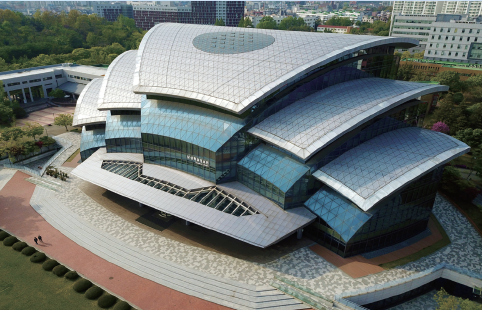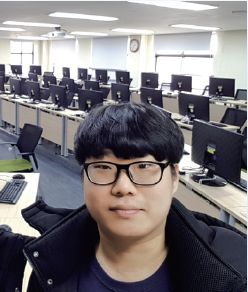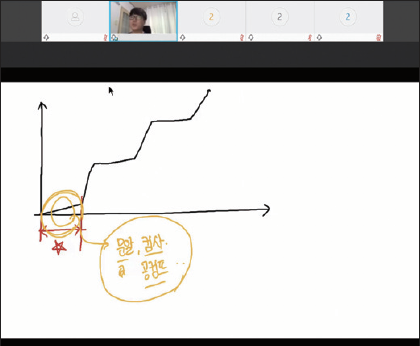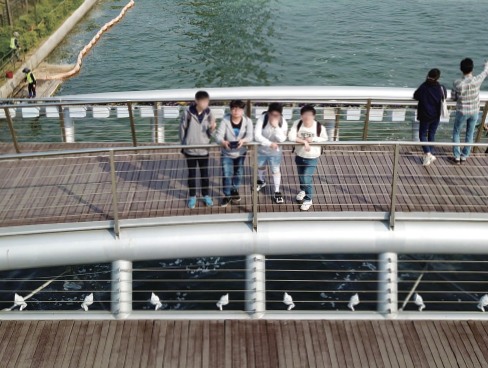October, full of autumn tints, has come already, and as time files to the end of the year, there may be some Kingos with concerns about the future. Many Kingos may want to work in the field of Information Technology (IT) as the world is in the Fourth Industrial Revolution era, but the lack of information for applying or preparing for these vocations can be a blockade for some of Kingos. For soothing career concerns, taking sincere advice, or knowing the path of Sungkyunkwan University (SKKU) graduates can be enormously helpful. Therefore, the Sungkyun Times (SKT) will convey the advice from Park Si-hyun, a graduate student from the Department of Disciplinary Education, who won the Minister’s Prize for Software.
Park Si-hyun, Graduate Student from the Department of Disciplinary Education
1. Please introduce yourself.
I graduated from the Department of Computer Education at SKKU in 2019, and since then, I have studied at the Department of Disciplinary Education in the Graduate School of Education at SKKU. Also, I have worked as a researcher in the Intelligent Vision Laboratory of Park Chun-su, a professor of the Department of Computer Education at SKKU, and the current research project is focused on object detection and data augmentation. Besides this, I work as a programming lecturer like a tutor for regular classes or private lessons.
2. Can you remember any memorable events when you were an undergraduate student?
The most memorable experience that influenced me was when working as a Teaching Assistant (TA) in Problem Solving and Algorithms, and Computational Thinking and Software (SW) Coding classes. Since 2017, I have worked as a TA for that class every regular semester, summer sessions, and winter sessions. Being a TA, I could experience the “class from a lecturer’s view” earlier than any other Kingos, and that is why this experience was special to me. Usually, I was in charge of the six classes, which is the maximum number of classes for every semester, except for only one semester that I was responsible for four classes. Working as a TA, as I gave a lecture six times a week, and not only did the performance of students get better but also my lecturing skills improved. At that point, I was pleased to observe my improvements, and that became the fundamental motivation to work as a TA with self-confidence.
3. Was there any difficulty while you were an undergraduate? If so, please tell us how you overcame that trouble.
Except for the common troubles that emerge while studying, I had not experienced any special problems for studying CS. For pedagogical subjects, however, that was the real trouble because my interests at that time were focused on CS. As time passed and as I took some CS pedagogy lectures, I could start to have an interest in pedagogies, so that eased the hardship in studying pedagogical subjects. In my opinion, problems that undergraduates encounter as they study their fields can be solved if they have an interest in the seemingly hard-to-know fields.
4. What motivated you to apply for graduate school, specifically, for the Department of Disciplinary Education at SKKU?
When I was a junior, I audited the programming class of my current academic advisor, Prof. Park. As an undergraduate, instead of registering for that course, I audited the class for the whole semester like other students and achieved high scores in the exams. That might be the point where the professor had an impression on me. In the next semester, I registered for the Computer Vision class of the same professor and requested to him that I would like to work on a Computer Vision project. Therefore, I completed the course before the semester started and worked on a project during the semester. My team won the Minister’s Prize for Software with this project, and this experience made me think about applying for graduate school. Finally, I entered the graduate school of SKKU to work with and get lessons from Prof. Park.
5. What do you do as a graduate student?
This semester, I do not work as a TA in the Problem Solving and Algorithm, and Computational Thinking and Software (SW) Coding classes since I am busy, but I am working as a TA for the programming practice room at the department of Computer Education. Further, as a graduate student, I have worked hard for researching and writing papers in the laboratory.

Stories About Software from the Lecturer, Park Si-hyun
6. Was there any particular moment when you decided to work as a programming lecturer?
As I mentioned above, working as a TA in regular classes was a valuable experience for me. Also, I could not overlook the reality, the financial problem. Considering what I can do well, I started to work as a lecturer in many different places.
7. Nowadays, coding skills are considered as an essential virtue for people, so you, as a lecturer, may have met students from a variety of fields. What are your thoughts as you have taught programming to them?
I was in charge of Python and Algorithm in the case of the SW Coding Qualification class in the Summer Session of the Challenge Semester in 2020. During the class, I met various students, ranging over elementary school through universities and even the elderly. This wide status of students results in various requests in a class. As I respond to their demands, I always find myself reflecting on whether I adequately respond to them.

8. Students from a variety of areas should have different programming levels, and students who are not majoring in CS could be stuck with no improvement. Please guide them to enhance their programming skills.
Improving the degree of programming skills is similar to navigating the stairs in that the improvement is not linear. Every person has their own rates of improvement, but to be honest, if there is the difference between the people majoring in CS and others, that difference begins from the different amount of time for studying CS between them. CS major students have more time to overcome their academic hardship, so they have a higher chance to develop. Once they overcome their hardship, they 10 In SKKU SKKU People 11 might have exponential growth in programming. The others, however, have less time to deal with diverse challenges, leading them to drop out. That is the actual difference between the CS major students and others. Once students see the treasure of the improvement, they might also get self-confidence in other programming areas. This is the object of my lectures. My ultimate goal as a lecturer is helping all students to achieve success, so I always try my best to help them maintain the self-directed growing ability. In addition to this, I instruct students to resolve their programming problems by themselves like how to view error messages, find bugs, and solve those problems. Once you achieve the level of a CS Professional, you can do whatever you want by referring to only a single example and to the programming documents, even when you encountered unfamiliar programming language or environment. Below that level, you necessarily have to confront the sequence of heading to a wall that blocks your improvement. You should face it and bump against the wall. Even if you are pushed down by the wall, your skills will get better; if the wall is shattered by you, obviously your skills will be improved. If you want to raise your programming skills, try to find the wall incessantly.

9. Many people dream of having an IT career because the world is in the Fourth Industrial Revolution era. Could you introduce the qualifications or other important factors for having an IT careers?
There are more jobs than what people commonly think there are in the IT area. From a wider range of view, the field is divided into development, research, maintenance, and so on; specifically, the category can be subdivided by programming languages and development environment. Last but not least, the must-have ability in the IT field is communication. Practically speaking, making a certain service by one person is a very rare case. That is, one massive project is progressed by multiple people, so they necessarily share and read the codes with each other. To increase productivity, writing intuitive codes, and sharing proper development guidelines with the members are the key points in practical development. For working in the IT area, you should develop yourself as a programmer but not consistently overlook the importance of cooperation.
As One of the Kingos, Park Si-hyun
10. Are there any plans for the future?
My priority assignment is to graduate as a student, so I will not participate in a massive course for a while. The point is, I am interested in the area that I am studying now. Thus, I did not decide whether to enter a higher school or work in a business yet, but I am trying my best for works in hand always.
11. As a graduate in the Department of Computer Education, and a studying undergraduate student, please advise Kingos about the attitudes or virtues for studying programming.
I always try to think from the perspective of a lecturer while studying such as, “I should instruct this subject to anyone.” If you try to make others understand, then you can reinforce your mindset by reducing indolence. Studying as a lecturer helps to get rid of indolence while studying. If you have any students to give lectures to, that might be the best case for studying. By the way, this habit is helpful for communication and cooperation ability.

12. As a Kingo, any last words for the other Kingos?
It is a very hard time for all because of the coronavirus disease 2019 (COVID-19). I hope to overcome this pandemic and for SKKU to become bustling again. Go Samsung Digital Library Taken from Park Si-hyun’s Research with a Drone Kingos!
